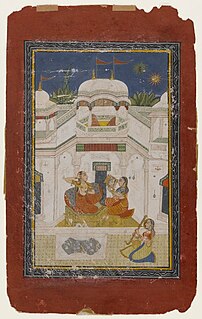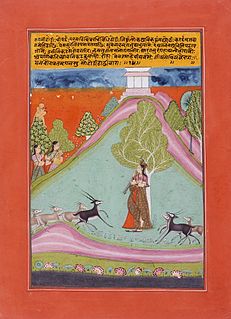
Bilaval or Bilawal is a raga and the basis for the eponymous thaat in Hindustani classical music. Raga Bilaval is named after Veraval, Gujarat.
Raga Malgunji is a Hindustani classical raga from the Khamaj family of raga. Some say it is a part of the Kafi Thaat too.
Darbari Kanada, or simply Raga Darbari,, is a raga in the Kanada family, which is thought to have originated in Carnatic music and brought into Hindustani classical music by Miyan Tansen, the legendary 16th-century composer in emperor Akbar's court. This tradition is reflected in the name itself; Darbar is the Persian derived word in Hindi meaning "court." As the most familiar raga in the Kanada family, it may sometimes also be called Shuddha Kanada or pure Kanada. It belongs to the Asavari thaat. This raag is called raaga Kaanada in Yakshagana.
Bageshri is a Hindustani classical raga. It is a popular raga of the late night, which is meant to depict the emotion of a woman waiting for reunion with her lover. It is said to have been first sung by Miyan Tansen, the celebrated court singer of the Emperor Akbar in the sixteenth century.
Bhupālī, is a raag in Kalyan Thaat
Bahar is a Hindustani classical raga. This raga is very similar to raga Malhar. This raga is from the Kafi Thaat.
Bhimpalasi is a Hindustani classical raga.
Bihag is a Hindustani classical raga belonging to the kalyan thaat.
Bilaskhani Todi is a Hindustani classical raga. It is a blend of the ragas Asavari and Todi, and has a close affinity with Komal Rishabh Asavari.
Sohini is a raga in Hindustani classical music in the Marwa thaat. Alternate transliterations include Sohani and Sohini. Like Bahar, it is a small raga, with not much space for elaboration. It emotes the feel of longing, of passive sensuousness.
Megh Malhar is a Hindustani classical raga. The name derives from the Sanskrit word Megh, meaning cloud. Legends say that this raga has the power to bring out rains in the area where it is sung. Megh Malhar is similar to raga Megh with a tint of Malhar in it.
Kafi is a raga in Hindustani classical music. It corresponds to Kharaharapriya in Carnatic music.
Megh is a Hindustani classical raga. The meaning of Megh in Sanskrit is 'Cloud'. Hence this raga is mostly sung or played in the Monsoon season. Another raga which describes rain is raga Malhar. So these 2 ragas where merged and a new raga was developed, this raga is raga Megh Malhar.

Raga Kedar, also known as Kedara, is a Hindustani classical raga. Named after Lord Shiva, the raga is placed on a high pedestal in the realms of Indian classical music. It is characterised by many complex turns, which are brilliantly melodious but difficult to express in words. This raag is the repetition of the swaras सा and म. It is generally accepted that there is much thermal energy in this melody and hence it is regarded as the Raagini of Raag Deepak. While preceding from Shuddha Madhyam (m) to Pancham (P), a touch of Gandhar (G) or a smooth passage from Gandhar (G) to Pancham (P) expressed as m G P is the more common way of instant Raag manifestation.
Durga is a raga in Hindustani Classical music. It shares some features with Shuddha Saveri of Carnatic music, but is significantly different from it in terms of the sancharas of the raga.
Tilak Kamod is a Hindustani classical raga.

Hindol is a Hindustani classical raga.
Multani is a Hindustani classical raga. The newer raga Madhuvanti was inspired by Multani. Multani belongs to Todi Thaat. It is generally sung in the third prahar of the day, that is, around 1 PM to 4 PM.

Ṛiṣabha/Risabha/Rishabh is the 2nd svara from the 7 svaras of Hindustani music. Risabha is the long form of the syllables रे and री. For simplicity in pronouncing while singing the syllable, Risabha is pronounced as Re and Ri. It is also called as ऋषभ in the Devanagri script.

Gāndhāra/Gāndhār/Gandhar/Gandhara is the 3rd svara from the 7 svaras of Hindustani music and Carnatic music. Gandhara is the long form of the syllable ग. For simplicity in pronouncing while singing the syllable, Gandhara is pronounced as Ga. It is also called as गान्धार or गंधार in the Devanagri script.




